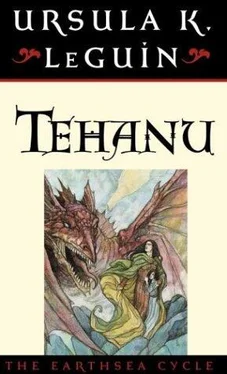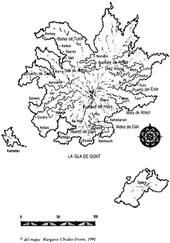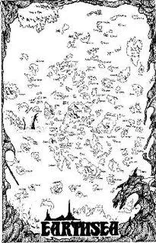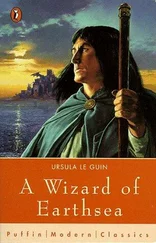Ursula Le Guin - Tehanu The Last Book of Earthsea
Здесь есть возможность читать онлайн «Ursula Le Guin - Tehanu The Last Book of Earthsea» весь текст электронной книги совершенно бесплатно (целиком полную версию без сокращений). В некоторых случаях можно слушать аудио, скачать через торрент в формате fb2 и присутствует краткое содержание. Город: New York, Год выпуска: 1990, Издательство: Atheneum, Жанр: Фэнтези, на английском языке. Описание произведения, (предисловие) а так же отзывы посетителей доступны на портале библиотеки ЛибКат.
- Название:Tehanu The Last Book of Earthsea
- Автор:
- Издательство:Atheneum
- Жанр:
- Год:1990
- Город:New York
- ISBN:нет данных
- Рейтинг книги:4 / 5. Голосов: 1
-
Избранное:Добавить в избранное
- Отзывы:
-
Ваша оценка:
- 80
- 1
- 2
- 3
- 4
- 5
Tehanu The Last Book of Earthsea: краткое содержание, описание и аннотация
Предлагаем к чтению аннотацию, описание, краткое содержание или предисловие (зависит от того, что написал сам автор книги «Tehanu The Last Book of Earthsea»). Если вы не нашли необходимую информацию о книге — напишите в комментариях, мы постараемся отыскать её.
Tehanu The Last Book of Earthsea — читать онлайн бесплатно полную книгу (весь текст) целиком
Ниже представлен текст книги, разбитый по страницам. Система сохранения места последней прочитанной страницы, позволяет с удобством читать онлайн бесплатно книгу «Tehanu The Last Book of Earthsea», без необходимости каждый раз заново искать на чём Вы остановились. Поставьте закладку, и сможете в любой момент перейти на страницу, на которой закончили чтение.
Интервал:
Закладка:
“Knowing what her life must be . . . “
Her anger with him, her stupid denial of the truth of what he told her, rose from disappointment. Though Lark had said ten times over that nothing could be done, yet she had hoped that Tenar could heal the burns; and for all her saying that even Ogion could not have done it, Tenar had hoped that Ged could heal Therru-could lay his hand on the scar and it would be whole and well, the blind eye bright, the clawed hand soft, the ruined life intact.
“Knowing what her life must be . . . “
The averted faces, the signs against evil, the horror and curiosity, the sickly pity and the prying threat, for harm draws harm to it . . . And never a man’s arms. Never anyone to hold her. Never anyone but Tenar. Oh, he was right, the child should have died, should be dead. They should have let her go into that dry land, she and Lark and Ivy, meddling old women, softhearted and cruel. He was right, he was always right. But then, the men who had used her for their needs and games, the woman who had suffered her to be used-they had been quite right to beat her unconscious and push her into the fire to burn to death. Only they had not been thorough. They had lost their nerve, they had left some life in her. That had been wrong. And everything she, Tenar, had done was wrong. She had been given to the dark powers as a child: she had been eaten by them, she had been suffered to be eaten. Did she think that by crossing the sea, by learning other languages, by being a man s wife, a mother of children, that by merely living her life, she could ever be anything but what she was-their servant, their food, theirs to use for their needs and games? Destroyed, she had drawn the destroyed to her, part of her own ruin, the body of her own evil.
The child’s hair was fine, warm, sweet-smelling. She lay curled up in the warmth of Tenar’s arms, dreaming. What wrong could she be? Wronged, wronged beyond all repair, but not wrong. Not lost, not lost, not lost. Tenar held her and lay still and set her mind on the light of her dreaming, the gulfs of bright air, the name of the dragon, the name of the star, Heart of the Swan, the Arrow, Tehanu.
She was combing the black goat for the fine underwool that she would spin and take to a weaver to make into cloth, the silky “fleecefell” of Gont Island. The old black goat had been combed a thousand times, and liked it, leaning into the dig and pull of the wire comb-teeth. The grey-black combings grew into a soft, dirty cloud, which Tenar at last stuffed into a net bag; she worked some burrs out of the fringes of the goat’s ears by way of thanks, and slapped her barrel flank companionably. “Bah!” the goat said, and trotted off. Tenar let herself out of the fenced pasture and came around in front of the house, glancing over the meadow to make sure Therru was still playing there.
Moss had shown the child how to weave grass baskets, and clumsy as her crippled hand was, she had begun to get the trick of it. She sat there in the meadow grass with her work on her lap, but she was not working. She was watching Sparrowhawk.
He stood a good way off, nearer the cliff’s edge. His back was turned, and he did not know anyone was watching him, for he was watching a bird, a young kestrel; and she in turn was watching some small prey she had glimpsed in the grass. She hung beating her wings, wanting to flush the vole or mouse, to panic it into a rush to its nest. The man stood, as intent, as hungry, gazing at the bird. Slowly he lifted his right hand, holding the forearm level, and he seemed to speak, though the wind bore his words away. The kestrel veered, crying her high, harsh, keening cry, and shot up and off toward the forests.
The man lowered his arm and stood still, watching the bird. The child and the woman were still. Only the bird flew, went free.
saw the hawk; saw the man; saw the birds come to him, come at his word, at his naming them, come beating their wings to hold his arm with their fierce talons; saw herself the hawk, the wild bird.
“He came to me once as a falcon, a pilgrim falcon,” Ogion had said, by the fire, on a winter day. He had been telling her of the spells of Changing, of transformations, of the mage Bordger who had become a bear. “He flew to me, to my wrist, out of the north and west. I brought him in by the fire here. He could not speak. Because I knew him, I was able to help him; he could put off the falcon, and be a man again, But there was always some hawk in him. They called him Sparrowhawk in his village because the wild hawks would come to him, at his word. Who are we? What is it to be a man? Before he had his name, before he had knowledge, before he had power, the hawk was in him, and the man, and the mage, and more-he was what we cannot name. And so are we all.”
The girl sitting at the hearth, gazing at the fire, listening,
Mice
Townsend, the sheep-buyer who had brought Ogion’s message to the farm in Middle Valley, came out one afternoon to the mage’s house.
“Will you be selling the goats, now Lord Ogion’s gone?”
“I might,” Tenar said neutrally. She had in fact been wondering how, if she stayed in Re Albi, she would get on. Like any wizard, Ogion had been supported by the people his skills and powers served-in his case, anyone on Gont. He had only to ask and what he needed would be given gratefully, a good bargain for the goodwill of a mage; but he never had to ask. Rather he had to give away the excess of food and raiment and tools and livestock and all necessities and ornaments that were offered or simply left on his doorstep. “What shall I do with them?” he would demand, perplexed, standing with his arms full of indignant, squawking chickens, or yards of tapestry, or pots of pickled beets.
But Tenar had left her living in the Middle Valley. She had not thought when she left so suddenly of how long she might stay. She had not brought with her the seven pieces of ivory, Flint’s hoard; nor would that money have been of use in the village except to buy land or livestock, or deal with some trader up from Gont Port peddling pellawi furs or silks of Lorbanery to the rich farmers and little lords of Gont. Flint’s farm gave her all she and Therru needed to eat and wear; but Ogion’s six goats and his beans and onions had been for his pleasure rather than his need. She had been living off his larder, the gifts of villagers who gave to her for his sake, and the generosity of Aunty Moss. Just yesterday the witch had said, “Dearie, my ringneck hen’s brood’s hatched out, and I’ll bring you two-three chickies when they begin to scratch. The mage wouldn’t keep ‘em, too noisy and silly, he said, but what’s a house without chickies at the door?”
Indeed her hens wandered in and out of Moss’s door freely, and slept on her bed, and enriched the smells of the dark, smoky, reeking room beyond belief.
“There’s a brown-and-white yearling nanny will make a fine milch goat,” Tenar said to the sharp-faced man.
“I was thinking of the whole lot,” he said. “Maybe. Only five or six of ‘em, right?”
“Six. They’re in the pasture up there if you want to have a look.”
“I’ll do that.” But he didn’t move. No eagerness, of course, was to be evinced on either side.
“Seen the great ship come in?” he asked.
Ogion’s house looked west and north, and from itone could see only the rocky headlands at the mouth of the bay, the Armed Cliffs; but from the village itself at several places one could look down the steep back-and-forth road to Gont Port and see the docks and the whole harbor. Shipwatching was a regular pursuit in Re Albi. There were generallY a couple of old men on the bench behind the smithy, which gave the best view, and though they might never in their lives have gone down the fifteen zigzag miles of that road to Gont Port, they watched the comings and goings of ships as a spectacle, strange yet familiar, provided for their entertainment.
Читать дальшеИнтервал:
Закладка:
Похожие книги на «Tehanu The Last Book of Earthsea»
Представляем Вашему вниманию похожие книги на «Tehanu The Last Book of Earthsea» списком для выбора. Мы отобрали схожую по названию и смыслу литературу в надежде предоставить читателям больше вариантов отыскать новые, интересные, ещё непрочитанные произведения.
Обсуждение, отзывы о книге «Tehanu The Last Book of Earthsea» и просто собственные мнения читателей. Оставьте ваши комментарии, напишите, что Вы думаете о произведении, его смысле или главных героях. Укажите что конкретно понравилось, а что нет, и почему Вы так считаете.








